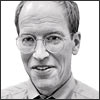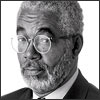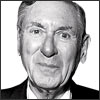 TOM GEOGHEGAN
TOM GEOGHEGAN
Author and labor lawyer
“Whatever you want to call him, you can’t call him a transformational mayor. The [private sector] money would’ve come here anyway. The Midwest was collapsing, and people were moving into Chicago who wanted a pied-à-terre here—our New York here in the Midwest. He turned part of [Chicago] into an elegant playground while the infrastructure of the city crumbled. Look at the CTA versus the RTA. Look at the Chicago Public Schools. Look at Cook County Hospital and the lack of health care in the city, even though it’s a medical cornucopia. [Daley] didn’t do enough to create a coalition in the state that would argue for higher [income] taxes and infrastructure spending and to take care of people who are not the wealthiest. But he didn’t come in to do that; he wasn’t going to rock the boat, and that was the whole point of the Daley administration. Is there anything to be said for him? Yes—he was against guns, he was a decent human being, and he was very aware that children were being murdered. I think he cared about that far more than the people that he was courting to put up things like Millennium Park.”
 SALIM MUWAKKIL
SALIM MUWAKKIL
Senior editor at In These Times
“On the one hand, it’s always a pleasure to show Chicago off to people who come into town. There has also been some effort to equalize resource allocation—although there hasn’t been enough of an attempt to award contracts to minority service providers. He also succeeded in quieting racial tensions in the city. He would come to a cultural affair on the South Side and make a display of solidarity. The mayor has been extremely adept at learning how to make those kinds of symbolic gestures. In many cases, they’ve served to distract attention from his lack of actual investment in various communities. If you look at the failure and dropout rates of the black students in the schools, you would have to say that he hasn’t been successful—especially after taking over the school system and making claims that he was going to change things. The other thing is criminal justice. The mayor has not been held sufficiently accountable for his role in that despicable torturing episode by Commander Burge. [Daley] could have initiated an investigation, but he instead came to the conclusion that he would suffer no great harm from ignoring it. And he was absolutely right.
 LOIS WILLE
LOIS WILLE
Pulitzer Prize–winning journalist
“My feelings about the son were really based on my feelings about the father. There were these interim years of Jane Byrne, Harold Washington, and Eugene Sawyer, but they seem to have come and gone without a whole lot of impact on the city. The current Mayor Daley was the first to really be concerned about schools and housing and disadvantaged communities. By tearing up the old way of doing things, he’s opened the door for change and improvement. Tearing down [the housing projects] was such a drastic measure that it took somebody pretty courageous. The same thing was true of schools. By the early 1990s, the U.S. secretary of education said [Chicago schools] were the worst in the nation. With Daley’s backing, the state [in 1995] did away with the old Chicago school board and gave the mayor more power. To take responsibility for those schools—when the failure rate seemed like 90 percent—was brave. No big urban area like Chicago has solved all the problems, but the foundation has been laid by Daley. It will be up to the next mayor to follow through.”
 LESTER CROWN
LESTER CROWN
Chairman of Henry Crown and Company
“Daley was excellent for the city. When you look at anybody that has a job that is complex, you have to look on the balance—you never get 100 percent perfection. But I don’t think there’s any question that the transformation of Chicago as a city was due in large part because of his leadership. He worked closely with the business sector. Private business makes the economy hum and grow, develops jobs; it is essential, and Daley did everything he could to really establish a business climate here that was welcoming. Boeing is a perfect example. Everybody wanted to bring them in, and [Daley] went all out to get them. There has also been a tremendous beautification of the city—take Millennium Park. Everything that you read in the paper was, it was going to be too late, cost too much money, it was wrong. The media had nothing but negative comments about it until the day it opened. That he is persistent and stubborn—that’s wonderful. He is absolutely honest and honorable, and he never aspired to any job other than being mayor of Chicago.”
RELATED STORY: Mayor Daley’s Bucket List: 10 Suggestions for How to Use the Rest of His Term »
Photography: (DALEY) Katrina Wittkamp; (Geoghegan, Wille) Esther Kang; (Muwakkil) James F. Quinn/Chicago Tribune; (Crown) Dianne Brogan/Chicago Tribune


